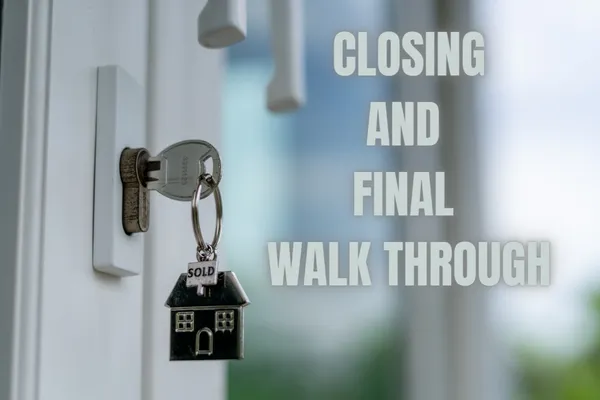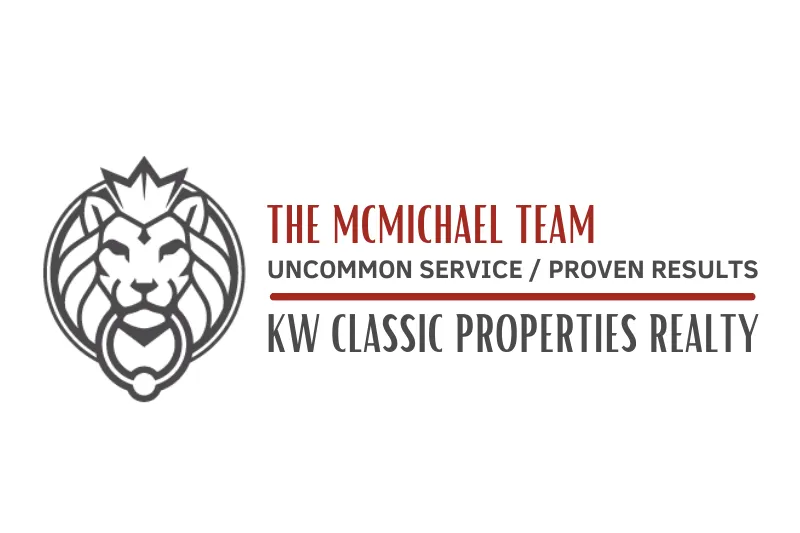Recent Posts

How to Prepare for the Final Walk-Through and Closing
“To know the road ahead, ask those coming back.” - Chinese Proverb
Introduction:
You're on a journey towards becoming a homeowner, and you're now approaching the final stages of the process: The final walk through and closing. These two important steps bring you closer to receiving the keys to your new home. In this article we'll delve into how to prepare for the walk through and closing, ensuring a smooth transition into your new chapter.

Navigating the Final Walk-Through and Closing Like a Pro ensure a smooth transition and the realization of your dream of owning a new home.👊
Understanding the Final Walk Through
Purpose of the Final Walk Through
The final walk-through plays a crucial role in the homebuying process. It grants you, as the buyer, an opportunity to inspect the property one last time before closing, to ensure everything is in the expected condition.
Timing of the Walk Through
Usually occurring a day or two prior to the scheduled closing date, this is when you can identify any issues that might need addressing before transferring ownership of the property.
Who Should Attend?
It's important for both the buyers and and their agent to be present during this walk through. This allows addressing of any concerns or questions that may arise. Your agent will make a list of any issues to address with the listing agent and seller.
Preparing for the Final Walk Through
Collecting Necessary Documents
Before the walk-through make sure you have all the essential paperwork ready. This includes your purchase agreement, inspection reports and any agreements regarding repairs made with the seller.
Verifying Repairs and Agreements
Review any repair requests or agreements that were made with the seller. Confirm that all agreed upon repairs have been satisfactorily completed and that there are no issues.
Creating a Checklist
To stay organized during the walk-through create a checklist of items to inspect. This might involve checking appliances, ensuring utilities are functioning properly, and making sure that the property is clean and free from any debris.
What to Look for During the Walk-Through
Inspecting the Property
During the walk-through look for any damage, leaks or problems with electrical systems, plumbing or HVAC systems. Test appliances to ensure they are in working order.
Addressing Any Issues
If you come across any problems or discrepancies during the walk-through discuss them with your real estate agent. They can assist you in determining what steps to take next. Whether its requesting repairs, negotiating credits, or potentially delaying the closing process.
Capturing Findings
During the walk-through make sure to take pictures or videos of any issues or areas that raise concerns. These visual records can be quite valuable in case further action needs to be taken.
What to Expect on Closing Day
The Process of Closing
Closing day marks the culmination of your homebuying journey. It entails signing all the closing documents, loan documents, and paperwork for transferring ownership.
Required Paperwork
Be prepared to review and sign documents such as the Closing Disclosure, which outlines the terms of your mortgage, and the deed that officially transfers ownership to you.
Closing Expenses and Payments
Prepare for closing costs that could include lender fees, title insurance payments, and property taxes. Make sure you have wired funds for these payments.
Preparing for a Smooth Closing Experience
Reviewing the Closing Disclosure Statement
Before closing day arrives, carefully go through the Closing Disclosure provided by your lender. This document provides information about the costs and terms of your mortgage so that there are no unexpected surprises during closing.
Arranging Funds
Prior to the big day, make arrangements to transfer funds required for closing. This will involve your down payment, closing costs, and any additional payments specified in the purchase contract.
Maintaining Communication with Your Agent
It's important to keep the lines of communication open between you, your real estate agent ,and your lender. Stay informed on any changes or updates leading up to closing day to avoid any surprises at the last minute.
Dealing with Common Challenges
Title Issues
Sometimes there can be complications with the title, such as, liens or disputes over property boundaries. Your real estate agent and title company will be there to guide you through resolving these challenges.
Last Minute Changes
Occasionally there may be changes to the closing documents at the last minute. Be prepared to review and sign any updated documents if necessary.
Delays and Rescheduling
Unexpected delays, like financing issues or incomplete repairs, can sometimes push back the closing date. It's important to remain flexible and work closely with your real estate team in order to address any delays promptly.
The Final Steps: Signatures and Handing Over the Keys
Signing the Documents
During the closing process make sure you carefully review and sign all documents as instructed by your settlement agent or attorney. It's crucial that you fully understand all terms and conditions related to your mortgage and ownership transfer.
Receiving Keys and Access
Once all documents have been signed and funds have been exchanged you'll finally receive the keys to your home. Take a moment to celebrate this milestone in becoming a homeowner.
Conclusion
Wrapping Up Your Journey towards Homeownership
Preparing for the final walk-through and closing are essential steps on your journey to homeownership. By understanding the purpose of these stages, thoroughly inspecting the property, and staying organized, you can ensure a smooth transition into your new home. The final signatures and handover of keys mark the beginning of an exciting chapter in your life.
Frequently Asked Questions (FAQs);
1. What is the purpose of the walk through?
The final walk through gives you the opportunity to inspect the property one last time before closing. It allows you to make sure everything is in the expected condition and address any concerns or issues.
2. What should I bring with me for the closing?
For the closing make sure to bring a valid photo ID, any funds needed for closing costs and down payment (these should be wired ahead of time), as well as a copy of your Closing Disclosure for reference.
3. How long does the closing process usually take?
Typically the closing process takes about an hour. However keep in mind that it can vary depending on factors such as transaction complexity and unexpected issues that may arise.
4. What happens if there are issues during the walk-through?
In case any issues are identified during the walk-through its recommended to discuss them with your real estate agent. Together you can negotiate solutions with the seller.
5. Can I reschedule the closing if necessary?
If you have valid reasons to reschedule, like unresolved issues or delays in financing, you can collaborate with your real estate agent and lender to find a more appropriate date for the closing.
Recent Posts

How to Prepare for the Final Walk-Through and Closing
“To know the road ahead, ask those coming back.” - Chinese Proverb
Introduction:
You're on a journey towards becoming a homeowner, and you're now approaching the final stages of the process: The final walk through and closing. These two important steps bring you closer to receiving the keys to your new home. In this article we'll delve into how to prepare for the walk through and closing, ensuring a smooth transition into your new chapter.

Navigating the Final Walk-Through and Closing Like a Pro ensure a smooth transition and the realization of your dream of owning a new home.👊
Understanding the Final Walk Through
Purpose of the Final Walk Through
The final walk-through plays a crucial role in the homebuying process. It grants you, as the buyer, an opportunity to inspect the property one last time before closing, to ensure everything is in the expected condition.
Timing of the Walk Through
Usually occurring a day or two prior to the scheduled closing date, this is when you can identify any issues that might need addressing before transferring ownership of the property.
Who Should Attend?
It's important for both the buyers and and their agent to be present during this walk through. This allows addressing of any concerns or questions that may arise. Your agent will make a list of any issues to address with the listing agent and seller.
Preparing for the Final Walk Through
Collecting Necessary Documents
Before the walk-through make sure you have all the essential paperwork ready. This includes your purchase agreement, inspection reports and any agreements regarding repairs made with the seller.
Verifying Repairs and Agreements
Review any repair requests or agreements that were made with the seller. Confirm that all agreed upon repairs have been satisfactorily completed and that there are no issues.
Creating a Checklist
To stay organized during the walk-through create a checklist of items to inspect. This might involve checking appliances, ensuring utilities are functioning properly, and making sure that the property is clean and free from any debris.
What to Look for During the Walk-Through
Inspecting the Property
During the walk-through look for any damage, leaks or problems with electrical systems, plumbing or HVAC systems. Test appliances to ensure they are in working order.
Addressing Any Issues
If you come across any problems or discrepancies during the walk-through discuss them with your real estate agent. They can assist you in determining what steps to take next. Whether its requesting repairs, negotiating credits, or potentially delaying the closing process.
Capturing Findings
During the walk-through make sure to take pictures or videos of any issues or areas that raise concerns. These visual records can be quite valuable in case further action needs to be taken.
What to Expect on Closing Day
The Process of Closing
Closing day marks the culmination of your homebuying journey. It entails signing all the closing documents, loan documents, and paperwork for transferring ownership.
Required Paperwork
Be prepared to review and sign documents such as the Closing Disclosure, which outlines the terms of your mortgage, and the deed that officially transfers ownership to you.
Closing Expenses and Payments
Prepare for closing costs that could include lender fees, title insurance payments, and property taxes. Make sure you have wired funds for these payments.
Preparing for a Smooth Closing Experience
Reviewing the Closing Disclosure Statement
Before closing day arrives, carefully go through the Closing Disclosure provided by your lender. This document provides information about the costs and terms of your mortgage so that there are no unexpected surprises during closing.
Arranging Funds
Prior to the big day, make arrangements to transfer funds required for closing. This will involve your down payment, closing costs, and any additional payments specified in the purchase contract.
Maintaining Communication with Your Agent
It's important to keep the lines of communication open between you, your real estate agent ,and your lender. Stay informed on any changes or updates leading up to closing day to avoid any surprises at the last minute.
Dealing with Common Challenges
Title Issues
Sometimes there can be complications with the title, such as, liens or disputes over property boundaries. Your real estate agent and title company will be there to guide you through resolving these challenges.
Last Minute Changes
Occasionally there may be changes to the closing documents at the last minute. Be prepared to review and sign any updated documents if necessary.
Delays and Rescheduling
Unexpected delays, like financing issues or incomplete repairs, can sometimes push back the closing date. It's important to remain flexible and work closely with your real estate team in order to address any delays promptly.
The Final Steps: Signatures and Handing Over the Keys
Signing the Documents
During the closing process make sure you carefully review and sign all documents as instructed by your settlement agent or attorney. It's crucial that you fully understand all terms and conditions related to your mortgage and ownership transfer.
Receiving Keys and Access
Once all documents have been signed and funds have been exchanged you'll finally receive the keys to your home. Take a moment to celebrate this milestone in becoming a homeowner.
Conclusion
Wrapping Up Your Journey towards Homeownership
Preparing for the final walk-through and closing are essential steps on your journey to homeownership. By understanding the purpose of these stages, thoroughly inspecting the property, and staying organized, you can ensure a smooth transition into your new home. The final signatures and handover of keys mark the beginning of an exciting chapter in your life.
Frequently Asked Questions (FAQs);
1. What is the purpose of the walk through?
The final walk through gives you the opportunity to inspect the property one last time before closing. It allows you to make sure everything is in the expected condition and address any concerns or issues.
2. What should I bring with me for the closing?
For the closing make sure to bring a valid photo ID, any funds needed for closing costs and down payment (these should be wired ahead of time), as well as a copy of your Closing Disclosure for reference.
3. How long does the closing process usually take?
Typically the closing process takes about an hour. However keep in mind that it can vary depending on factors such as transaction complexity and unexpected issues that may arise.
4. What happens if there are issues during the walk-through?
In case any issues are identified during the walk-through its recommended to discuss them with your real estate agent. Together you can negotiate solutions with the seller.
5. Can I reschedule the closing if necessary?
If you have valid reasons to reschedule, like unresolved issues or delays in financing, you can collaborate with your real estate agent and lender to find a more appropriate date for the closing.

1349 W. Lane Ave, Suite 1125, Columbus, OH, 43221
(614) 769-7766
(614) 768-6531
www.livingincolumbus.com





